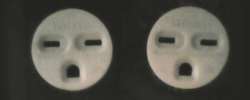Keebler posted:Thanks, it's looking like I have to go to the TSOP package anyway. It doesn't look like they sell through hole SOJ sockets. I'll have to pickup a few cheap parts to practice on. Poking around I see people even do it using a toaster over! Maybe I'll give that a shot for shits and giggles. Skillets look better than toasters for smd work.
|
|
|
|
|

|
| # ? Apr 27, 2024 20:58 |
|
What's the best way to use a pad-per-hole breadboard? So far I'm just leaving the component wires a bit long and then bending them over and soldering a bit more to connect different points, and using wires for longer points. Is there some technique or tutorial you guys could show me?
|
|
|
Fatal posted:What's the best way to use a pad-per-hole breadboard? So far I'm just leaving the component wires a bit long and then bending them over and soldering a bit more to connect different points, and using wires for longer points. Is there some technique or tutorial you guys could show me? other than that there's wire wrapping, which IMO is more trouble than it's worth. Unless you want a really nice looking job, what you're doing is probably fine. Just make sure to cover connections with electrical tape to prevent shorts.
|
|
|
|
|
After you solder some traces, you can hit them with fingernail polish for some two-cent insulation. I wouldn't cross traces in direct contact with just nail polish protecting but it helps avoid those "whoops chassis too small, shorted all my parts out" situations. And yeah, I just solder 'paths' with the component leads. Make sure the component leads have good contact to one another, don't rely on solder blobs to carry the juice.
|
|
|
|
Speaking of protoboard, Sparkfun just came out with these which I am surprised didn't already exist. It just makes sense. $4.50 is a bit much in my books, but I like the idea.
|
|
|
|
turbo sex bat 4000 posted:Speaking of protoboard, Sparkfun just came out with these which I am surprised didn't already exist. It just makes sense. That is really neat. I'm a pretty big fan of Sparkfun, so many neat things for projects.
|
|
|
|
Does anyone know anything about ARM processors? I have worked on an Atmel before, i love those things, but these look simply too good to be true for a lot of the bigger projects I will be soon getting into since my senior project is coming up. So does that look like a good deal? or am i being stupid and should stick to Atmel?
|
|
|
|
MAH POKEYMANS posted:Does anyone know anything about ARM processors? I have worked on an Atmel before, i love those things, but these look simply too good to be true for a lot of the bigger projects I will be soon getting into since my senior project is coming up. So does that look like a good deal? or am i being stupid and should stick to Atmel? I take it you mean AVR? Because Atmel makes ARM7 and ARM9 based microcontrollers, amongst other things. They also have an interesting looking architecture in the AVR32 line. (also, check out the new AVR xmega series if you haven't already and have used the atmega series) The question is what are you going to be doing. I'm in a similar situation looking at different microcontrollers for an upcoming senior project (robot for an IEEE contest in case anyone cares). We used a single atmega for the robot last year, but it wasn't doing anything more computationally intensive than a moving average and some comparisons based on ADC readings. This year we're looking at image processing, which brings us to much larger controllers if things need to be done quickly. The beagleboard seems like a good choice, there is also gumstix, but they're pricier. I haven't used anything other than 8bit MCUs either, and would also appreciate some advice on these ARM dev boards.
|
|
|
MAH POKEYMANS posted:Does anyone know anything about ARM processors? I have worked on an Atmel before, i love those things, but these look simply too good to be true for a lot of the bigger projects I will be soon getting into since my senior project is coming up. So does that look like a good deal? or am i being stupid and should stick to Atmel? I've tried working with atmel ARM chips and it is, IMO, a lot different than the mega and tiny atmel mcus. You pretty much have to use C, since the assembly is pretty hard to understand (unlike other avrs which are easy to use with just assembly) and if you do use a higher level language then you're pretty much detached from the hardware. I'm sure for a programming whiz it's no problem, but my forte is hardware, not software, so I really couldn't get the hang of it. And that thing you linked is much more than an ARM. It's practically a computer. I have no experience with something of that level. You should really consider whether you need the 32 bit architecture. Unless you're moving tons of data (like with imaging like was mentioned or complex math), it's likely not necessary.
|
|
|
|
|
hobbesmaster posted:I take it you mean AVR? Because Atmel makes ARM7 and ARM9 based microcontrollers, amongst other things. They also have an interesting looking architecture in the AVR32 line. (also, check out the new AVR xmega series if you haven't already and have used the atmega series) Yeah I meant AVR, thanks for correcting me. And my senior project is also lots of image processing and i think it will require a good amount of computational power so I am looking into learning on the beagleboard. I am actually thinking about ordering one and just figuring it out as I go.
|
|
|
|
Ok, I'm trying to build this radio on a breadboard but I'm having a hard time finding certain components. I've found mostly everything (you'd be surprised how hard it is to find a 15uF electrolytic capacitor) but I can't find the transistor (2N918 NPN) or diode (1N82 or NTE112 if you believe a random comment on the site). Are there replacement parts I can find somewhere? Why the hell are these hard to find?
|
|
|
McMurphy posted:Ok, I'm trying to build this radio on a breadboard but I'm having a hard time finding certain components. I've found mostly everything (you'd be surprised how hard it is to find a 15uF electrolytic capacitor) but I can't find the transistor (2N918 NPN) or diode (1N82 or NTE112 if you believe a random comment on the site). Are there replacement parts I can find somewhere? Why the hell are these hard to find? Also, building RF stuff on a breadboard isn't a good idea because the capacitance in the contacts is enough to affect performance. You should probably solder connections and keep wire lengths at a minimum.
|
|
|
|
|
mtwieg posted:Also, building RF stuff on a breadboard isn't a good idea because the capacitance in the contacts is enough to affect performance. You should probably solder connections and keep wire lengths at a minimum. Would having a wide range on the variable capacitor correct this? The schematic calls for a 18pF cap, so if I got a .7 - 30pF cap, would that work? I'm still a newbie so I don't fully understand capacitance so please bear with me.
|
|
|
|
Don't bother building anything remotely high frequency on a breadboard. There is so much parasitic inductance and capacitance so you will not get a working circuit no matter how hard you try.
|
|
|
McMurphy posted:Would having a wide range on the variable capacitor correct this? The schematic calls for a 18pF cap, so if I got a .7 - 30pF cap, would that work? I'm still a newbie so I don't fully understand capacitance so please bear with me.
|
|
|
|
|
MAH POKEYMANS posted:Don't bother building anything remotely high frequency on a breadboard. There is so much parasitic inductance and capacitance so you will not get a working circuit no matter how hard you try. Can you explain why this is? What would be a more suitable way to prototype a HF circuit? Edit: Nevermind, found out the answer. Jerry Bindle fucked around with this message at 23:17 on Aug 17, 2008 |
|
|
|
About to buy the beagle board and futz around with it. It looks to be a monstrously good deal for what's on board, i love that it has a DSP on it, and I want to learn to code for ARMs since they are so common in the market. Edit: Jeeze I was looking at the specs of this thing and it is ridiculous. I don't think I will even be able to scratch the surface of the capabilities of this with my limited embedded system knowledge. Still going to be a fun thing to mess around with i think. Locker Room Zubaz fucked around with this message at 05:12 on Aug 18, 2008 |
|
|
|
So I finally have a working theremin built from this site. Right now I have it working through an AM radio, but I need to hook it up to an amplifier to get it through a speaker so I can also have volume control. Would that be something I could just build, or something that I would need to purchase?
|
|
|
|
What's the difference between unipolar and bipolar motors? I'm looking for a cheap reversible motor that can run off 9VDC, doesn't need to go more than 10RPM or so. What are my options?
|
|
|
|
ante posted:What's the difference between unipolar and bipolar motors? You're referring to two types of stepper motors I assume? quote:I'm looking for a cheap reversible motor that can run off 9VDC, doesn't need to go more than 10RPM or so. 10rpm? As in .16Hz? You'll need a gearbox to do that... and all DC motors are reversible by definition.
|
|
|
|
How safe is it to run wire under my car (8 and 4 gauge power wire from + batt terminal to amplifiers)?
|
|
|
|
As in under the carpets inside your car, or on the exterior underside of the car? The former should be fine assuming your wires are sized appropriately for the current draw of your amps. The latter is just a bad idea.
|
|
|
|
Hello, I need some help on my guitar wiring. This is the schematic that I am using, with a few changes: I am using two single coil pickups (P90's) instead of humbuckers, and due to my 3-way switch breaking, I am currently using a 5-way switch. The guitar cavity is shielded with aluminum foil tape and electrical tape, and the grounds are star grounded. My problem is that I am getting a discharge from the capacitor (so every time I touch something metal, there is a quiet popping noise) and I would like to know if anyone here has any suggestions as to what I can do to stop the popping? I've tried moving around the capacitor's ground, but that doesn't really seem to help at all.
|
|
|
|
You could probably run cable under the car if it was armoured or inside conduit. It's not really worth the trouble though unless your car is a complete maze inside or like 50' long. Don't just drill a hole and pass the wire through, that's just asking for trouble.
|
|
|
|
I want to play with microcontollers. Looking around there are a lot of kits and such, but I really have no clue where to start. It's been four years since I've either programmed anything in C or BASIC and done any kind of college coursework with circuits (first year physics). What's a good starting point? Could I just order a pre-built Arduino and protoshield and dive in with tutorials and such provided on the net, or should I find a commercial kit like the BoE-Bot where it has directed guides that guide you toward an end product?
|
|
|
|
I had to do some soldering earlier today, and every time I picked up the iron my hand was shaking like I'd developed a case of intermittent acute Parkinson's disease. Breathing out seemed to help, but does anyone have any other tips?
|
|
|
|
SecretFire posted:I had to do some soldering earlier today, and every time I picked up the iron my hand was shaking like I'd developed a case of intermittent acute Parkinson's disease. Breathing out seemed to help, but does anyone have any other tips? Practice helps more than anything else. I was kind of afraid when first soldering (OMG it says 600!), just working with it helped me more than anything.
|
|
|
|
SecretFire posted:I had to do some soldering earlier today, and every time I picked up the iron my hand was shaking like I'd developed a case of intermittent acute Parkinson's disease. Breathing out seemed to help, but does anyone have any other tips? Relax your grip and don't drink a bunch of caffeine before hand. I have that happen sometimes if I go to solder right after downing a big cup of coffee.
|
|
|
|
SecretFire posted:I had to do some soldering earlier today, and every time I picked up the iron my hand was shaking like I'd developed a case of intermittent acute Parkinson's disease. Breathing out seemed to help, but does anyone have any other tips? I've heard that it helps if you rest part of your arm or hand on the table. zeroprime posted:I want to play with microcontollers. Looking around there are a lot of kits and such, but I really have no clue where to start. It's been four years since I've either programmed anything in C or BASIC and done any kind of college coursework with circuits (first year physics). What's a good starting point? Could I just order a pre-built Arduino and protoshield and dive in with tutorials and such provided on the net, or should I find a commercial kit like the BoE-Bot where it has directed guides that guide you toward an end product? There's no way we can know what you know, but my guess is that you'd probably be fine with an Arduino. There are usually tutorials targeted at people with little experience.
|
|
|
|
I'm trying to find a replacement for a specific motor- a Mabuchi RF-500TB-14415. I've found sites selling industrial quantities at http://www.dswbrand.com/electromotor.php and at http://www.icphotos.org/photo/RF500TB14415.html. I don't need thousands, I just need one. Can anyone tell me somewhere I could buy a single one of these?
|
|
|
|
This thread makes me feel sad that I wasted my time with an Associates Degree in EE from ITT Tech. I went through the courses, barely understanding the material and left the school with a useless degree, and no knowledge that I could take to the real world. Looking at the original thread, it seems that the information there is refreshing my memory on what everything means etc, and it's great. I think maybe if I were to pursue the courses again at a real college that I'd really like the stuff but I unfortunately work at a Call Center for an ISP as a Lead Technician. I want to drop it all and work on a business degree in the future to be part of management. I hate ITT.  Sorry for derail, I just wanted to say that I like the thread.
|
|
|
|
Hey, I was really interested in old radios for a while. I have an old philco 1942 and I was going to repair it, but I ran out of enthusiasm waiting for the parts to arrive over the months. I can't decide on whether to ditch the project. I have all the parts now, but old high voltage radio sets have to be tuned based on lead lengths in the chassis. It won't actually pick up AM when I finish without an AM frequency shifter. Even then it's AM. It was fun to play with when I didn't have a job, but now it's been sitting in storage for over a year. I feel guilty for spending the money on parts and such, but it really is just too much work for right now. I was thinking of just refitting the face plate and putting a modern system in the cabinet. The problem is what do I do with the radio and the parts? Should I try to resell them? I can't imagine who would buy this stuff.
|
|
|
|
Vim Fuego posted:I'm trying to find a replacement for a specific motor- a Mabuchi RF-500TB-14415. I've found sites selling industrial quantities at http://www.dswbrand.com/electromotor.php and at http://www.icphotos.org/photo/RF500TB14415.html. I don't need thousands, I just need one. Can anyone tell me somewhere I could buy a single one of these? You can always pretend to be a company and request to purchase a sample. Sometimes you'll get it for free. This is kind of a douche move though, so use it as a last resort.
|
|
|
|
Vaporware posted:Hey, I was really interested in old radios for a while. I have an old philco 1942 and I was going to repair it, but I ran out of enthusiasm waiting for the parts to arrive over the months. Don't be a loser and quit when you've gotten this far. First, if you have an AM receiver, tuning is NOT that sensitive. When you put the new caps in, you MAY have to tweek it, but usually you don't. Why? Unless you changed out mica caps in the tuned circuit, other component changes are not going to affect it that much. If you are talking about an AM receiver, lead length is not important. Second - Are you talking about an old FM receiver, with the FM band down in the 50 MHz range? Those radios were usually AM and FM band. Photos please. Third - 1940s and up radio receivers are simple. About that time, everybody settled on about the same electronic design. Seriously, you could pick up any radio from that era and except for a resistor here or capacitor there, it was the same. Fitting another radio inside and making it look seamless, that is tougher. Fourth - LOTS of people fix up old radios. If you do decide to sell the set, go to rec.antiques.radio+phono newsgroup. The buy, sell and discuss old radio repair here. But, seriously, you put the cash in - fix it already. It is as simple as this: (1) Get the schematic (2) Clip out the first paper cap the cap's body (3) Make tiny hooks out of the remaining leads (4) Solder in your new capacitor (5) Repeat 2-4 until all paper caps are replaced (6) Section by section, replace the filter cap (7) Check the resistance of any series-dropping resistors in the power supply circuit. (8) Turn on radio, and apply 120 AC - or better yet, get a variac and SLOWLY bring up the line voltage, listening/smelling for problems. (9) Troubleshoot issues (10) Success. Talk to the guys that newsgroup - this is all they talk about. And don't give up.
|
|
|
|
Here is one of my projects - a AM/Shortware radio receiver made by the Hallicrafters Co.  I work on it during lunchtime. So far, I've replaced all of the paper and electrolytic caps, out of tolerance resistors and bad tubes, cleaned the case and chassis, replaced the dial cords and lubed all the moving parts, rewired the AC to reduce the hazards of 'hot chassis' and tested it by tuning to WBZ (our local 50kW AM radio station - you can recieve it on a water pipe and a diode). The volume pot is really scratchy, and tuning of the oscillator and rf coils was 'vauge'. I'm at step (9) of my list. Once I am done, I'll have a nice shortwave radio to put on my bookshelf in the office.
|
|
|
|
I can't remember the freq range. edit: radio website posted:MODEL 42-380X I have the schematics and all that, but according to my research I should rewire the whole set. I have a lot of insulator rot. The cabinet on the other hand is mighty fine. I had a family friend refinish it, which I know destroys the value, but this is a common model and the veneer is very beautiful. Plus it has drink rings and such on the top and needed a good resealing.
|
|
|
|
Vaporware posted:I can't remember the freq range. edit: Philco cut costs WAY DOWN on their radios, as a result, they always need more work to get going. And, you are working on one of those big ones... Still, replacing the wiring isn't that bad. Projects like this work better when you only take on 30 minute - 1 hour of drudgery (like replacing every wire...), patience is key in this hobby. quote:The cabinet on the other hand is mighty fine. I had a family friend refinish it, which I know destroys the value, but this is a common model and the veneer is very beautiful. Plus it has drink rings and such on the top and needed a good resealing. Radio cabinets aren't 19th century furnature. They all were built cheaply, and usually look like junk after storage in a humid basement or garage. Refinishing is common, and improves the value for most any radio of this type. You need silicone oil. You only need to take care with the wiring for the high band, before the IF mixer. Everything after that mixer is non-critical. HiroshigeStations fucked around with this message at 19:48 on Sep 5, 2008 |
|
|
|
SecretFire posted:I had to do some soldering earlier today, and every time I picked up the iron my hand was shaking like I'd developed a case of intermittent acute Parkinson's disease. Breathing out seemed to help, but does anyone have any other tips? this may sound stupid but you might consider getting one of the child "learn to solder" sets. I was pretty nervous my first time and screwed up quite a bit. If you're working one something complicated do this first.
|
|
|
|
In the interest of giving this thread another jolt, I'm considering giving another series of lessons/tutorials. If you didn't catch my first one on switching power supplies, it starts on page 12 and goes until page 15. As far as subjects go, I have a few ideas: 1. Resonance oscillators (would be pretty technical) 2. Signal filters, effects (like stuff you'd use in audio to make effects and stuff. Somewhat technical) 3. Transistor circuits, like amplifiers and voltage regulators. Tons of possibilities. Not very math intensive, but a little "deep") 4. Eagle Cad tutorial for people wanting to make their own custom printed circuit boards. Not technical really. 5. Something microcontroller related. My experience is with AVRs, which are pretty user friendly. It would be pretty technical. If anyone has any other ideas, shout out. I'll decide which on to do based on indicated interest from you guys.
|
|
|
|
|

|
| # ? Apr 27, 2024 20:58 |
|
MAH POKEYMANS posted:Does anyone know anything about ARM processors? I have worked on an Atmel before, i love those things, but these look simply too good to be true for a lot of the bigger projects I will be soon getting into since my senior project is coming up. So does that look like a good deal? or am i being stupid and should stick to Atmel? I may have mentioned it before, but this chipset is very easy to use if you're affluent with ATmega or similar stuff, and the board feature set looks pretty good for universal projects : http://microcontrollershop.com/product_info.php?cPath=154_170_267&products_id=1414 This is the particular board that I used : https://www.priio.com/productcart/pc/viewPrd.asp?idcategory=5&idproduct=79 Depending on what you get, you may spend a good amount of time writing functions to use the I/O on the board itself,or you may find that you can download a full RTOS that takes care of most of that for you for your specific board. I had a ton of fun writing the hardware level stuff to familiarize myself with the AT91SAM7x, but if you're going to put it on the net, that FreeRTOS with TCP/IP stack is a life saver 
|
|
|






























